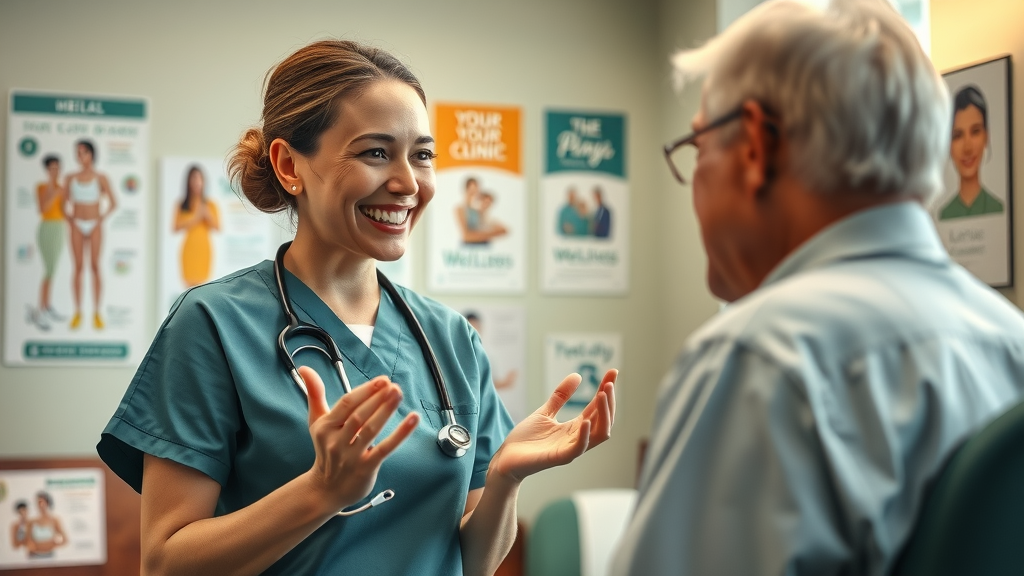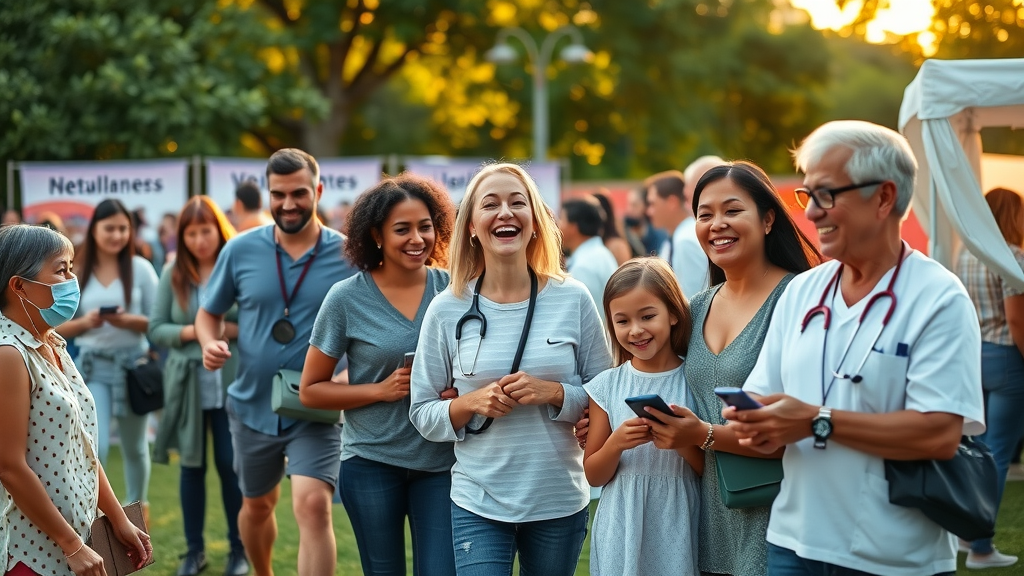Did you know that communities with robust local health care and public health professionals experience up to 20% lower rates of preventable diseases? This eye-opening statistic highlights the often-overlooked power of local health experts. From navigating daily health challenges to managing unexpected emergencies, these experts form the backbone of healthier, more resilient communities. In this article, you’ll discover how they boost wellness, improve access to care, and support your personal goals—in ways national systems simply can't.
Local Health Experts: The Hidden Champions of Your Community’s Public Health
- In this article, discover how local health experts directly influence community health, improve access to quality care, strengthen public health infrastructure, and support your personal wellness goals.
"Did you know that communities with robust local health care and public health professionals experience up to 20% lower rates of preventable diseases?"

Local health experts assisting community members in a modern neighborhood clinic lobby
Local health experts aren’t just healthcare providers; they’re advocates, educators, and the first line of defense for public health in your neighborhood. Trusted by community members, these professionals bridge gaps between complex health care systems and the real-world needs of diverse populations. Whether it’s Lee Health frontliners in your area hospital or those running outreach clinics, their hands-on efforts ensure that sensitive information is safely connected to care where it's needed most. The importance of local health experts extends beyond routine checkups. They tailor care services for neighborhood realities, accounting for unique health conditions, social determinants, and cultural preferences. By understanding the specific needs—ranging from chronic illness management to preventive screenings—they are able to design impactful wellness programs. Their deep community roots make it possible for them to respond faster in emergencies, share sensitive information securely, and provide up-to-date health information on official government websites. With this strategic positioning, they play a fundamental role in reducing disparities and improving population health outcomes more effectively than generalized, large-scale health systems.
How Local Health Experts Improve Access to Health Care and Quality Outcomes
One of the most immediate benefits of engaging with local health experts is improved access to health care and better health outcomes. Unlike distant health professionals unfamiliar with specific community challenges, these providers offer personalized care, promptly address medical conditions, and facilitate ongoing support for patients. By working within established local health infrastructure, they ensure essential resources are distributed equitably—especially to pregnant women, vulnerable children, and those with chronic illnesses. The result is a strengthened health system with notably higher patient satisfaction and wellness. Health professionals can swiftly share sensitive information where privacy is crucial, offer health care services tailored to local needs, and promptly mobilize during health crises. This is especially critical in low-income neighborhoods and for populations who may be at risk of falling through the cracks of larger administrative health systems. Over time, this leads to reduced hospital visits, increased use of preventive services like immunizations, and better support for community-wide mental health initiatives—all resulting in stronger, healthier communities.
Strengthening Public Health Infrastructure with Local Health Experts

Public health professionals collaborating to strengthen local health infrastructure
Public health infrastructure serves as the backbone of any successful health care system. Local health experts play a crucial role in building and maintaining this foundation by facilitating disease surveillance, coordinating vaccination drives, and overseeing emergency preparedness. Their firsthand understanding of community-specific health trends allows them to implement evidence-based interventions that address the actual needs on the ground. This real-time feedback loop ensures that every dollar spent on public health services brings the maximum possible benefit to the community.
By involving community members in health promotion activities, local health professionals make resources more accessible and foster trust. They provide educational sessions on disease prevention, inform residents about the safe sharing of sensitive information on official government platforms, and continually enhance their skills through APHA membership and other professional development activities. The combined effect is a robust health infrastructure that not only responds to current needs but also anticipates future challenges, ensuring the wellbeing of all residents for years to come.
Supporting Mental Health: The Pivotal Role of Local Health Professionals
In the realm of mental health , local health professionals are often the most approachable and effective advocates. Because they operate within the community, they’re able to recognize early signs of mental health issues, provide timely intervention, and connect individuals to specialized services. Unlike broader national systems, local health networks are attuned to community stigmas, unique stressors, and the specific cultural factors that impact mental health—particularly in populations that may feel marginalized or underserved. These professionals are essential for ensuring confidential, stigma-free access to care, especially during crises or after traumatic events. They educate residents on the importance of mental wellness, promote community resiliency, and offer tailored support groups. In doing so, local health professionals fill a critical gap, offering holistic care that addresses both physical and emotional wellbeing—a key advantage for any health care system seeking to truly innovate in support of its people.
| Metric | With Strong Infrastructure | Without Strong Infrastructure |
|---|---|---|
| Preventable Diseases | Low incidence | Higher incidence |
| Hospital Visits | Reduced ER visits | Frequent ER visits |
| Community Outreach Programs | Active and accessible | Limited/no outreach |
| Patient Satisfaction | High | Lower |
The Unique Advantages of Working with Public Health Professionals and Health Professionals Locally
- Personalized care plans
- Culturally relevant services
- Faster emergency response
- Direct public health guidance
"Access to local health experts isn't just a convenience—it’s a proven path to longer, healthier lives."

Attentive local health professional provides personalized guidance to a patient
Choosing to work with local public health professionals and health professionals means your care is rooted in deep knowledge of your area’s unique challenges and strengths. When you walk into a trusted community clinic or connect with a provider from your local gov website, you receive health information that is not only accurate but tailored to your family’s circumstances, traditions, and beliefs. These personalized care plans increase compliance, improve health outcomes, and foster a sense of belonging and accountability among patients.
Culturally relevant care ensures that language barriers, traditions, and sensitive topics are handled with respect and understanding. Local health experts are often trained to interpret community data, advocate for the allocation of resources, and rally public health campaigns with a personal touch. Whether during emergencies or routine care, their ability to mobilize quickly can mean the difference between timely intervention and missed opportunities. By collaborating with public health professionals, you benefit from immediate, practical guidance—strengthening both your wellness and that of your entire neighborhood.
Understanding the Impact of Local Health Experts on Community Public Health and Wellness
The impact of local health experts on public health and wellness is visible in the everyday lives of your neighbors and family. When experienced professionals take charge of vaccination drives, disease screening events, and community wellness classes, the ripple effect transforms the entire health landscape. There is a marked decrease in the spread of infectious diseases, a boost in health literacy, and greater resilience when public health emergencies occur.
Local health professionals persistently monitor, evaluate, and address community health needs—remaining vigilant for emerging threats and ready to pivot strategies as needed. Their involvement in policy-making ensures that legislation is rooted in the realities of community health, not theoretical ideals. By maintaining open communication with residents and local agencies, they build the trust necessary for sensitive information sharing, especially between official government organizations and individual households.
How a Strong Public Health Infrastructure Saves Lives Locally
A well-developed public health infrastructure is a lifesaver—quite literally. Through coordinated immunization campaigns, disaster preparedness training, and health promotion programs, local health professionals prevent outbreaks, reduce chronic disease rates, and improve emergency response times. Residents benefit from swift intervention when issues arise, such as sudden flu epidemics or natural disasters. The connection between strong health infrastructure and longevity is direct: more comprehensive care services are delivered to those in need, fewer people fall through bureaucratic cracks, and the community as a whole enjoys a longer, healthier life. Access to local care also minimizes the administrative delays common with larger health systems or organizations in the United States, ensuring crucial information and support arrive when residents need them most.
Real-Life Examples: Success Stories from Local Health Experts

Local health experts leading public health event with community participation
Across the nation, communities are thriving thanks to the intervention of dedicated local health experts. In one town, proactive public health professionals initiated a series of free screening clinics for diabetes and hypertension, leading to a 15% reduction in emergency hospital admissions within just two years. In urban centers and rural villages alike, APHA membership and ongoing education keep these professionals equipped with the latest treatment protocols and patient engagement strategies. Another notable example comes from Lee Health's collaborative outreach program, where mobile health vans delivered preventative care and vaccination clinics to underserved neighborhoods. This innovative approach built trust with community members, increased immunization rates among children, and ensured that sensitive medical information was managed securely and confidentially. These stories prove that when local expertise leads the way, measurable improvements in public health and individual wellness are not just possible—they’re inevitable.
Engage With Local Health Experts: How to Find the Right Public Health Professionals for You
Ready to take control of your wellness? The next step is engaging with local health experts who are deeply invested in the well-being of your neighborhood. Start by identifying clinics and professionals affiliated with reputable health care systems such as Lee Health or those featured on your official government organization’s resource listings. These sources prioritize the privacy and security of your sensitive information and connection to evidence-based care. When selecting a provider, prioritize those who are visible in community outreach programs, have active APHA membership, and participate in public health campaigns. Look for clinics that offer culturally relevant care services, are transparent about their credentials, and have a reputation for patient satisfaction. Online reviews, local health board listings, and referrals from other community members can also guide your decision, ensuring you choose a professional with proven impact.
Evaluating Credentials and Community Impact for Health Care Providers

Patient evaluating credentials and impact of a local health professional in a home office
Determining the best fit among local health professionals requires careful evaluation. Begin by checking credentials and licenses through secure websites, such as your state’s health department or official government organization pages. Confirm their involvement in professional networks, continuing education, and APHA membership, signaling ongoing commitment to excellence. Dig deeper by asking about their community impact—have they led public health initiatives? Do they contribute to local wellness boards or mentor new professionals? A track record of leadership in health care services and the ability to share sensitive information responsibly signals trustworthiness. Patient testimonials and participation in culturally relevant programming can further reveal how effectively a provider engages with the community, helping strengthen the local health system and infrastructure.
Questions to Ask When Choosing a Local Health Professional
Choosing the right provider sets the foundation for your health journey. Essential questions include:
- Are you actively involved in community health outreach or emergency response?
- How do you ensure patient privacy and manage sensitive health information?
- Can you provide culturally competent care or services aligned with my family’s needs?
- What steps do you take to stay current with public health protocols and APHA membership guidelines?
- What have been some measurable impacts of your public health work in the community?
These inquiries establish rapport while focusing on the transparency, engagement, and accountability necessary for lasting wellness.
People Also Ask
What does the local health department do?
Local health departments provide community-wide public health services , disease surveillance, immunizations, emergency preparedness, and health promotion initiatives tailored to meet your neighborhood’s specific needs. They serve as a trusted resource for verified health information, confidential support, and vital outreach programs that keep your community resilient and informed.
How to find a functional health doctor?
Begin by seeking referrals from your local health network, consulting official gov website listings, and reviewing credentials from reliable sources. Functional health doctors take a holistic approach, considering both physical and mental health factors, and often participate in community health boards or public health programs. Their integrative practice model makes them ideal for personalized wellness journeys.
How do I choose a health care provider?
Selecting the right health care provider means prioritizing those with strong community ties, a track record of public health outcomes, and current, credible certifications. Trustworthy providers are typically recognized for their engagement in outreach programs, participation in professional networks, and positive testimonials from other local patients seeking health care services.
What are local health care services?
Local health care services encompass primary family medicine, public health screenings, immunizations, mental health counseling, chronic disease management, and emergency response—delivered by compassionate health professionals rooted in your community. These services are designed to be both accessible and deeply attuned to the priorities and realities of local residents.
Frequently Asked Questions About Local Health Experts, Public Health, and Health Care
- What is the difference between a public health professional and a local health expert? Public health professionals set broader health policies and coordinate system-wide strategies, while local health experts implement care and outreach directly within the community, addressing unique local needs.
- How do local health professionals contribute to faster emergency care? Their close community presence allows rapid mobilization, immediate intervention, and coordination with local emergency resources—minimizing delays and improving outcomes in urgent situations.
- Can local health experts help address mental health needs? Yes, local experts provide confidential mental health screenings, counseling, and resource referrals while reducing stigma and increasing accessibility through community outreach.
- How can I support my community’s local health infrastructure? Participate in public health programs, advocate for funding, volunteer at events, and provide feedback to local clinics and officials—strengthening the entire public health ecosystem.
Ready to Empower Your Wellness? Connect With Local Health Experts and Start Living Healthier Today
Take your next step toward optimum health: Find and connect with trusted local health experts now, and experience first-hand the benefits of personalized, accessible, community-centered care that truly makes a difference in your life!
 Add Row
Add Row  Add
Add 




Write A Comment